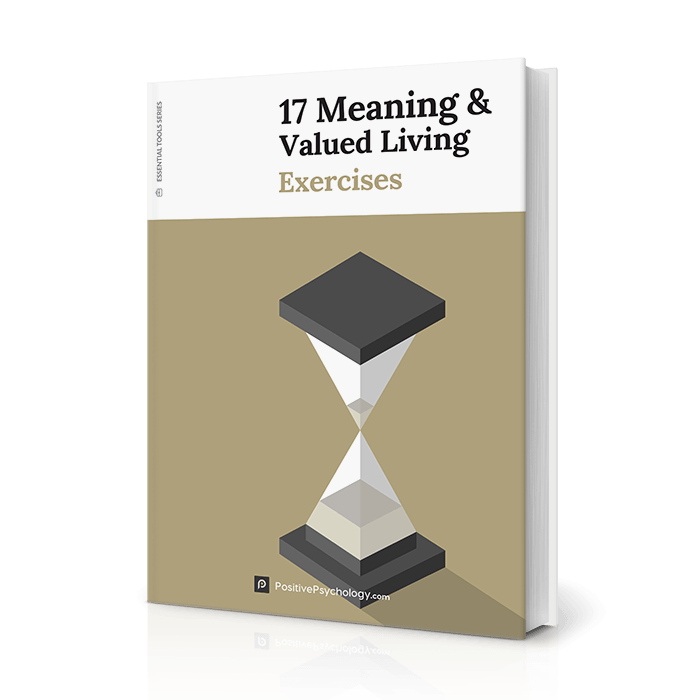18 Best Growth Mindset Activities, Worksheets, and Questions
 Many of us are aware of the importance of adopting a growth mindset and perhaps even believe we have done so already.
Many of us are aware of the importance of adopting a growth mindset and perhaps even believe we have done so already.
But do we really know what we mean when we talk about moving from fixed thinking to the growth zone?
Findings from research into the benefits of a growth mindset have been well received. Knowing that “the view you adopt for yourself profoundly affects the way you lead your life” means we all have the potential for change (Dweck, 2017).
This article digs a little deeper, exploring the supporting research and steps needed to adopt a growth mindset.
Before you continue, we thought you might like to download our three Meaning and Valued Living Exercises for free. These creative, science-based exercises will help you learn more about your values, motivations, and goals and give you the tools to inspire a sense of meaning in the lives of your clients, students, or employees.
This Article Contains:
- Growth Mindset vs Fixed Mindset
- Research Behind the Theory and Model
- How to Coach Clients Toward a Growth Mindset
- Growth Mindset Interventions: 2 Examples
- 3 Activities, Games, and Exercises for Adults
- Best Worksheets, Workbooks, and Handouts
- Assessing Mindset: 3 Questionnaires and Tests
- 8 Questions to Ask Your Clients
- Become a Mindset Coach: 3 Training Options
- Resources From PositivePsychology.com
- A Take-Home Message
- References
Growth Mindset vs Fixed Mindset
“Individuals who believe their talents can be developed (through hard work, good strategies, and input from others) have a growth mindset” (Dweck, 2016). On the other hand, those with a fixed mindset believe such talents are an innate gift and not easily changed.
While Carol Dweck’s pioneering work on the growth mindset has had a considerable impact since her 2014 TED Talk and more recent book Mindset, it is often misunderstood.
Therefore, it is essential to be clear on exactly what a growth mindset is and avoid some of the common misconceptions that arise, including (Dweck, 2016):
- I’ve always had it.
A false growth mindset often results from confusing the concept with flexibility or open-mindedness. We are all a mixture of fixed and growth mindsets; we can’t claim to have always had one or the other. - It’s just about praising effort.
While effort is essential, it must be productive. Deep engagement in the processes that lead to positive outcomes is vital, such as trying out new strategies, asking for help, and learning from failure. - Talking about a growth mindset is enough.
Adopting a growth mindset means more than saying it’s a great outlook to have. Organizations, in particular, need to encourage staff to take appropriate risks, support collaboration over competition, and facilitate learning and development.
To enter or remain in the growth zone, we must recognize fixed mindset triggers we find in the environment that hold us back. It could be fear of failure or uncertainty over competence. Once we recognize what makes us feel defensive or threatened, we can challenge and even talk back to it (Dweck, 2016).
As Angela Duckworth (2018, p. 180) notes, “some of us believe, deep down, that people really can change.” That’s a growth mindset.
Growth-minded individuals believe that we can get smarter with the right opportunities, degree of effort, and self-belief. Those who are more fixed in their outlook agree that you can learn skills (e.g., fixing a car, riding a bike, etc.) but believe you can’t train your talent.
A setback for someone with a fixed mindset can be catastrophic, believing they don’t have what it takes, while someone with a growth mindset sees it as a chance to learn and get better (Duckworth, 2018).
Research Behind the Theory and Model

Dweck and others have spent years researching what a growth mindset is and is not, and their findings back up their claims (Dweck, 2017).
In a 2013 study, Gunderson et al. found that praising effort in children leads to a growth mindset, while encouraging inherent abilities leads to adopting fixed-ability frameworks. Ongoing research has identified that adopting a growth mindset dramatically changes how you approach life and encourages success in education, business, and even relationships (Dweck, 2017).
Yeager and Dweck (2020) explained the current state of research into growth mindsets in education and attempted to answer some of the challenges and questions surrounding the theory. Some examples from their research are included below.
1. Does a growth mindset predict academic outcomes?
Mostly. “There is a replicable and generalizable association between mindsets and achievement” (Yeager & Dweck, 2020, p. 5).
A fixed mindset typically predicts lower academic results in tests and exams compared with a growth mindset. However, findings suggest that it may not have an effect when hours of study are very high, such as in Mainland China, with a reported 57 hours of study per week.
2. Do growth mindset interventions work?
Not always. While growth interventions (for example, encouraging effort, seeking help, and changing strategies) sometimes improve academic success, that is not always the case. Outcomes vary depending on the individual’s psychological profile and the type of interventions used.
It appears that finding a growth mindset intervention appropriate to the individual and their needs is crucial.
3. Can teachers instill a growth mindset in their students?
Unclear. Mindset interventions either aimed at or administered by teachers at scale have not generally proved successful. Despite immense care and effort, positive results have not been immediate. And yet, benefits may be seen in the longer term.
It seems positive results are more likely in response to direct-to-student programs that teach students a growth mindset directly.
While inconclusive, there appears to be a theme rising from the research. Adopting a growth mindset is not a silver bullet, always guaranteeing better performance and improved outcomes. Yet, when an intervention is well timed and appropriate to the individual, a shift in mindset becomes apparent, leading to success in multiple areas of life (Dweck, 2017).
How to Coach Clients Toward a Growth Mindset
When coaching someone to adopt a growth mindset, you must help them learn what it looks like in themselves and others. Only then can they begin to make the changes needed to spend more time in the growth zone.
The following approaches will help.
What is a growth mindset?
Introduce and explore the following statement defining a growth mindset with your client (Yeager & Dweck, 2020, p. 1):
“A growth mindset is the belief that personal characteristics, such as intellectual abilities, can be developed, and a fixed mindset is the belief that these characteristics are fixed and unchangeable.”
Ask the client to consider and discuss the following:
- In the last seven days, when have you displayed a fixed mindset?
- In the last seven days, when have you displayed a growth mindset?
- Which mindset worked out and why?
- When would you like to adopt a growth mindset more often?
Recognizing a growth mindset
Ask the client to think about someone (a friend, family member, or someone famous) who spends most of their time in a fixed mindset (modified from Dweck, 2017):
- How do they act and talk?
- Are they extremely sensitive to being wrong?
- Are you this way?
Now, think of someone who exhibits a growth mindset and ask yourself:
- How do they view and approach obstacles?
- How do they stretch themselves?
Ask the client to consider why you may enjoy and get more out of life with a growth mindset. Discuss and list some pros and cons.
Growth Mindset Interventions: 2 Examples

There are several interventions we can use to help someone use their abilities to learn, develop a growth mindset, and challenge a fixed mindset, including the following.
Visualizing a dilemma
We are confronted with daily dilemmas. Some are small (What should we have for lunch?) while others significantly impact our lives (Should we work for a startup?).
While we must always balance potential risks and gains, opening yourself up to growth does not mean you become careless. Instead, you will become more yourself, not less (Dweck, 2017).
Try visualizing some real and artificial dilemmas. How would you react to the situation from a fixed versus a growth mindset? Consider the following two examples:
- You didn’t get the offer you had hoped for from graduate school.
A fixed mindset might tell you that you were fooling yourself. You were never going to get in, and that’s that.
Using a growth mindset, you go further. You think about your goal. What are you trying to achieve? Could you get back in contact with the school to see what options you have or apply for a different one? Perhaps you could commit to additional studies then try applying again.
- The project didn’t go well; mistakes were made.
A fixed mindset might ask, Well what did they expect? After all, I didn’t have the skills needed. You accept the failure and, most likely, repeat the mistakes in the future.
Using your newfound growth mindset, you think about how you could learn from what went wrong. You get the team together to consider what you can salvage, how you can fix what’s wrong, and how you can prevent it from happening again.
A growth mindset is ultimately more favorable because it puts you back in control.
Review your rejections
We have all experienced rejection, likely many times. To ensure future instances are less catastrophic, it can help to consider past examples and ask yourself some growth-related questions.
- Think of several situations where you felt rejected. Perhaps you were turned down for a date, didn’t get on the basketball team, or didn’t get offered the job.
- What did you learn?
- Did the experience teach you more about yourself and what you do and don’t want out of life?
- What positives came out of the rejection (perhaps not immediately, but later)?
- Can you forgive the person who rejected you, wish them well, and let go of any bitterness?
The joy of being wrong – Freethink
3 Activities, Games, and Exercises for Adults
Finding ways to adopt a growth mindset can be fun, especially when performed in pairs or groups. Here are some great exercises to try.
Seek out challenge
In his book Think Again, Adam Grant (2021) encourages readers to escape ‘echo chambers’ where everyone agrees with you. Instead, challenge your mindset by seeking out people who think differently.
If you hold a particular view about something, encourage a reasoned discussion with non-likeminded people where you challenge one another. Don’t just try to beat them; learn from them. What didn’t you know before? Should you alter your view, perhaps becoming more moderate, or replace it?
Group settings can become powerful opportunities to challenge your entrenched beliefs and views.
Embrace the joy of being wrong
We often become so fixed in our thinking or concerned about looking foolish that we hold on to our beliefs despite new information to the contrary.
When you find out that you are mistaken or need to update your thinking, welcome it and be prepared to laugh at yourself. Focus on improving rather than proving yourself (Grant, 2021).
Sometimes sharing our mistakes and learning can provide a sense of freedom, for yourself and others.
Picture your ideal relationship
While we often imagine ideal relationships (romantic, business, or otherwise) as harmonious and without disagreement, it is most likely unrealistic and not in our best interests (Dweck, 2016).
Work with your partner(s) and consider how a growth relationship might tackle different situations.
For example, consider a romantic relationship, where someone gets an inviting text from an ex. Take different mindset positions and reflect on how you might respond.
Best Worksheets, Workbooks, and Handouts

It offers training and free resources, including study guides, handouts, and lesson plans (for parents and teachers) to nurture positive learning beliefs, habits, and cultures.
For more resources for teaching students a growth mindset directly, try out some of the resources available at PERTS. Applying research-based practices, PERTS aims to create learning environments for students and empower educators to thrive. Learning programs are available for students of all ages and include a learning library and Mindset Kit.
Assessing Mindset: 3 Questionnaires and Tests
There are plenty of mindset tests available for scoring growth mindsets and highlighting opportunities to improve. Check out the following sample of three:
- The research-validated Mindset Assessment at Mindset Works identifies elements of your mindset that are fixed and helps you to develop strategies to move toward growth.
- PERTS’ Mindset Kit offers a mindset assessment involving journal writing for children in second grade.
- IDR Labs had a growth mindset test that highlights an individual’s degree of fixed versus growth mindset based on Dweck’s research.
While some of the above tests may not have been scientifically validated, they offer insight into areas of our thinking that we should consider revisiting.
8 Questions to Ask Your Clients

Regarding abilities:
- Your intelligence is something that you can’t change very much.
- You can learn new things, but you can’t really change how intelligent you are.
- No matter how intelligent you are, you can still change a bit.
- You can always substantially change how intelligent you are.
If you strongly agree with statements 1 and 2, you are more fixed in your thinking. Agreeing with statements 3 and 4 suggests you adopt more of a growth mindset.
Regarding personal qualities:
- You have certain personal qualities, and there is little you can do to change that.
- No matter who you are, you can always change substantially.
- You may change how you do things, but you can’t change the essential elements of who you are.
- You can always change the basic things about who you are.
Statements 1 and 3 suggest a fixed mindset, while 2 (in particular) and 4 indicate you have a growth mindset.
Become a Mindset Coach: 3 Training Options
The following three training options are valuable for learning how to be a mindset coach.
- The Mindset Coach Academy provides training and direct access to tools and techniques to help transform your clients.
- Positive Performance Training offers a four-month, small group training course in how to set up a mindset coaching business.
- Transformation Academy teaches you how to support others on a journey to mastering their mindset.
The above is a sample of some of the commercial courses available. Search around and check out reviews to ensure the course suits your needs, budget, and time.
Resources From PositivePsychology.com
Looking for more tools to help shift your clients’ mindsets? Take a look at the following free worksheets.
- Adopt A Growth Mindset
This exercise helps clients recognize instances of fixed mindset in their thinking and actions and replace them with thoughts and behaviors more supportive of a growth mindset. - Fact Checking Thoughts Worksheet
This exercise helps clients differentiate between facts and opinions as the first step toward challenging harmful opinions about ourselves and others. - Simple Thought Diary Worksheet
This simple thought diary template can help clients systematically link experiences and situations to thoughts and emotions, serving as a useful tool to review one’s commonly adopted mindset.
If you’re looking for more science-based ways to help others discover meaning, check out this collection of 17 validated meaning tools for practitioners. Use them to help others choose directions for their lives in alignment with what is truly important to them.
A Take-Home Message
Over the last decade, the idea of adopting a growth mindset has become commonplace. Educators, businesses, and individuals may all claim to have adopted one without fully understanding what that means.
Having a growth mindset means recognizing our ability to change who we are, what we know, and how we think. Our personal qualities and abilities are not static; they remain open to change from outside and within.
For many, this may offer a significant shift in their outlook of who they are and can become. Recognizing our capacity for growth and development places accountability on ourselves to take charge and develop in the direction of our choosing.
Whether working on yourself or with a client, review the theory and try out the questions and exercises to understand which mindset you rely on. Then identify what changes you wish to make to enter the growth zone. The choice is ultimately yours, but a growth mindset may open up new opportunities for you that may have previously seemed impossible.
We hope you enjoyed reading this article. Don’t forget to download our three Meaning and Valued Living Exercises for free.
- Duckworth, A. (2018). Grit. Scribner.
- Dweck, C. S. (2016). What having a “growth mindset” actually means. Harvard Business Review. Retrieved September 21, 2021, from https://hbr.org/2016/01/what-having-a-growth-mindset-actually-means
- Dweck, C. S. (2017). Mindset. Robinson.
- Grant, A. M. (2021). Think again. Viking.
- Gunderson, E. A., Gripshover, S. J., Romero, C., Dweck, C. S., Goldin-Meadow, S., & Levine, S. C. (2013). Parent praise to 1- to 3-year-olds predicts children’s motivational frameworks 5 years later. Child Development, 84(5), 1526–1541.
- Yeager, D. S., & Dweck, C. S. (2020). What can be learned from growth mindset controversies? American Psychologist, 75(9), 1269–1284.
Let us know your thoughts
Read other articles by their category
- Body & Brain (49)
- Coaching & Application (57)
- Compassion (26)
- Counseling (51)
- Emotional Intelligence (24)
- Gratitude (18)
- Grief & Bereavement (21)
- Happiness & SWB (40)
- Meaning & Values (26)
- Meditation (20)
- Mindfulness (45)
- Motivation & Goals (45)
- Optimism & Mindset (34)
- Positive CBT (28)
- Positive Communication (20)
- Positive Education (47)
- Positive Emotions (32)
- Positive Leadership (18)
- Positive Parenting (4)
- Positive Psychology (33)
- Positive Workplace (37)
- Productivity (17)
- Relationships (46)
- Resilience & Coping (36)
- Self Awareness (21)
- Self Esteem (38)
- Strengths & Virtues (32)
- Stress & Burnout Prevention (34)
- Theory & Books (46)
- Therapy Exercises (37)
- Types of Therapy (64)






What our readers think
Thank you for the overview and resources. The information you provided is helpful. I would point out that the examples of dilemmas may not be dilemmas. That question led me to consider whether the issue of growth mindset should be considered only in the context of dilemmas, but I think not. I also wonder if a growth mindset is a necessary component to achievement. I don’t have an instinct for an answer to that one. Cheers!
Hi Robert,
Thank you for taking the time to read and engage with the article! We appreciate your insights and the thoughtfulness you put into your comment.
You made an interesting observation about dilemmas, highlighting the versatility of a growth mindset in various life aspects. Regarding its necessity for achievement, a growth mindset is beneficial but not solely responsible, as factors like motivation, resources, and environmental support are also vital.
We encourage you to keep exploring these ideas! If you have any more thoughts or questions, please don’t hesitate to share.
Kind regards,
Julia | Community Manager
This article was truly helpful as it helped me know my mindset.
Thanks a lot….
This is truly helpful, may God bless the writer